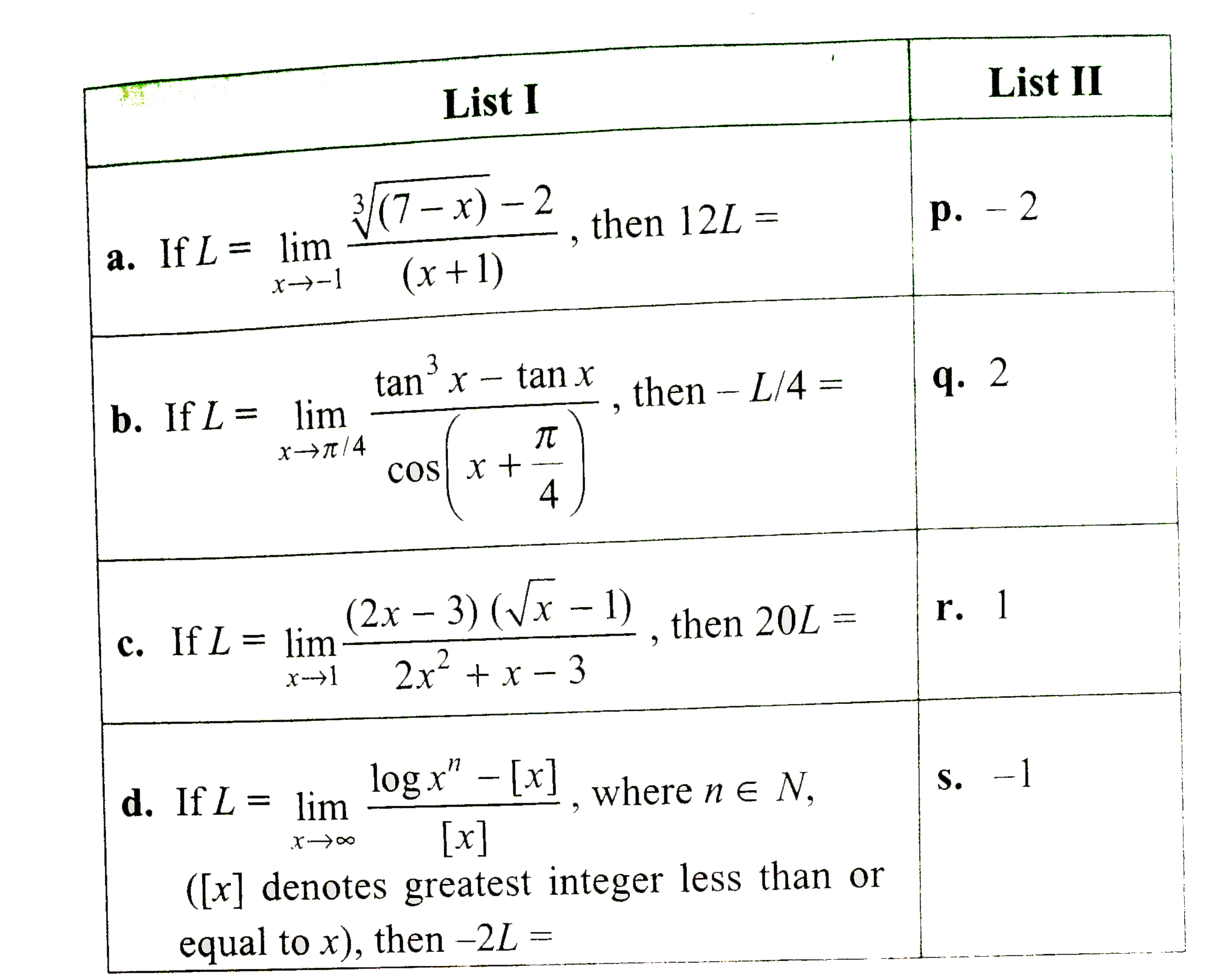If f(x)=0 is a quadratic equation such that f(−π)=f(π)=0 and f(π2)=−3π24, then limx→−π+f(x)sin(sinx) is equal to Solution in Bengali
−32π
−12
(2π)
32π
The correct Answer is:C
Given f(x)=x2−π2
limx→−π+x2−π2sin(sinx)=limh→0(−π+h)2−π2sin(sin(−π+h))
=limh→0−2hπ+h2−sin(sinh)
=limh→0h−2π−sin(sinh)sinh×sinhh=2π
Topper's Solved these Questions
- LIMITSBOOK - CENGAGE PUBLICATIONCHAPTER - LIMITSEXERCISE - Linked Comprehension Type
20 Videos
- LIMITSBOOK - CENGAGE PUBLICATIONCHAPTER - LIMITSEXERCISE - Matrix Match Type
5 Videos
- LIMITSBOOK - CENGAGE PUBLICATIONCHAPTER - LIMITSEXERCISE - EXERCISE 2.8
8 Videos
- JEE 2019BOOK - CENGAGE PUBLICATIONCHAPTER - JEE 2019EXERCISE - Chapter 10
8 Videos
- LINEAR COMBINATION OF VECTORS, DEPENDENT AND INDEPENDENT VECTORSBOOK - CENGAGE PUBLICATIONCHAPTER - LINEAR COMBINATION OF VECTORS, DEPENDENT AND INDEPENDENT VECTORSEXERCISE - DPP 1.2
10 Videos
Similar Questions
Letf(x)=sin−1(1−{x})×cos−1(1−{x})√2{x}×(1−{x}), where {x} denotes the fractional part of x.
L=limx→0−f(x) is equal to
View SolutionMatch the following lists:

View SolutionEvaluate limx→1cosπ2x1−√x
View SolutionIf y = y(x) is the solution of the differential equation, xdydx+2y=x2 satisfying y(1) = 1, then y(12) is equal to
View SolutionThe number of integral values of p for which (p+1)ˆi−3ˆj+pˆk,pˆi+(p+1)ˆj−3ˆk and −3ˆi+pˆj+(p+1)ˆk are linearly dependent vectors is q
View SolutionIf f(x)=0 be a quadratic equation such that f(−π)=f(π)=0 and f(π2)=−3π24,then limx→πf(x)sin(sinx) is equal to:
View SolutionIf f(x)=0 be a quadratic equation such that f(-pi)=f(pi)=0 and f((pi)/(2))=(-3 pi^(2))/(4), then lim_(x rarr pi)(f(x))/(sin(sin x)) is equal to:
View SolutionIf f(x)=0 is a quadratic equation such that f(−π)=f(π)=0 and f(π2)=−3π24, then limx→−πf(x)sin(sinx) is equal to (a)0 (b) π (c) 2π (d) none of these
View SolutionIf f(x) is twice differentiable in x in[0,pi] such that f(0)=f(pi)=0 and int_(0)^((pi)/(2))(f(2x)+f'(2x))sin x cos xdx=k pi ,then k is
View SolutionIf f(pi)=2 and int_(0)^( pi)(f(x)+f'(x))sin xdx=5 then f(0) is equal to
View SolutionLet f(x) be a quadratic function such that f(0)=f(1)=0&f(2)=1, then lim_(x rarr0)(cos((pi)/(2)cos^(2)x))/(f^(2)(x)) equal to
View SolutionIf f(π)=2 and ∫π0(f(x)+f''(x))sinxdx=5, then f(0) is equal to ( it is given that f(x) is continuous in [0,π])
View Solutionसिद्ध कीजिए कि :
∫π/20f(x)f(x)+f(π2−x)=π4.
View SolutionStatement - I : for f(x)=sinx,f'(π)=f'(3π)
Statement - II : for f(x)=sinx,f(π)=f(3π)
View SolutionStatement -I : f(x) = sin x then f' (π) = f' (3π)
Statement - (ii) : f(x) = sin x then f (π) = f (3π)
View Solutionxy'−y=x2(xcosx+sinx) and if f(π)=π then find f''(π2)+f(π2)=
View Solution
